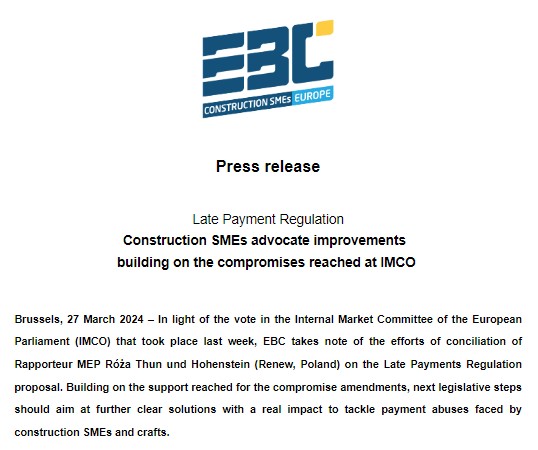
Late Payment Regulation Construction SMEs advocate improvements building on the compromises reached at IMCO
March 27, 2024
In light of the vote in the Internal Market Committee of the European Parliament (IMCO) that took place last week, EBC takes note of the efforts of conciliation of Rapporteur MEP Róża Thun und Hohenstein (Renew, Poland) on the Late Payments Regulation proposal. Building on the support reached for the compromise amendments, next legislative steps should aim at further clear solutions with a real impact to tackle payment abuses faced by construction SMEs and crafts.
Since the European Commission’s proposal to revise the Late Payments Directive in the form of a Regulation in autumn 2023, a very polarizing and fast-moving legislative process has been underway. The proposal has been the subject of heavy opposition, particularly from large companies, leading even to the postponement of the vote planned in February in the leading IMCO Committee.
In this context, in a spirit of compromise, EBC welcomes that the report by Ms. Thun und Hohenstein received a clear vote of approval in IMCO last week. For its part, EBC has never ceased to point out the reality of the situation in the construction sector, where the large majority of very small businesses are suffering from a lack of liquidity and cash flow due to late payments, an uneven balance of power in their commercial transactions with public authorities and big business, and a need for investment capacity to complete their digital and environmental transition.
Therefore, our construction SMEs welcome the willingness shown by most European political groups in the IMCO committee to support the adoption of a Late Payment Regulation that:
- Gets rid of the concept of “grossly unfair”;
- Includes a clear payment term of 30 days for B2G transaction and for most B2B transaction;
- Enables the offsetting of amounts due to public authorities in case of late payments;
- Upkeeps and reinforces the role, independence and means of national enforcement authorities;
- Supports a better payment culture through transparency and awareness raising;
- Supports SMEs with a standard EU complaint form and financial capacity-building actions;
- Allows for a longer transition period for debtor micro companies;
- Sets up a European Observatory of late payments.
In contrast, worried by the absence or lack of support for certain provisions, construction SMEs and crafts call for:
- Supporting the provisions on payment to subcontractors in public procurement. Article 4 of the EC proposal contains important safeguards for companies active in subcontracting. It is therefore of utmost importance to safeguard these provisions in the upcoming steps of the legislative process. Elements such as the possibility for subcontractors to be paid directly by public authorities, notably construction SMEs, should be added to the Commission’s proposal to empower SMEs and for consistency with the current Public Procurement Directive.
- Including the option of grouping of invoices allowing for national rules in that sense, a possibility that is currently used by and facilitates the daily operations of many construction SMEs and crafts across Europe.
- Decomplexifying payment terms. The formulation approved by IMCO would allow to prolong payment terms to 60 days with an additional 30-day verification period option for B2B transactions. Cumulatively leading to payment periods of up to 90 days, this makes the framework hard to navigate and goes completely against the desire for clarification and simplification that strengthens SMEs.
- Avoiding too vague definitions regarding “slow-moving goods” and “seasonal goods”, which would benefit from a 120-day payment period. Unclear or too broad definitions would pave the way for loopholes and abuses.
- Including reporting on payment practices for large undertakings, with a view of providing consistent data from both the public and private sector to the enforcement authorities, which in turn could feed the expected European Observatory of late payments.
The IMCO Report provides improvements, respects the subsidiarity principle, and considers the need for a transition period and a framework adapted to the needs and realities of SMEs. EBC thus calls upon Members of the European Parliament to support the positive elements brought forward by the IMCO Report in view of the expected plenary vote in April. At the same time, adopting further solutions in line with the suggestions of construction SMEs and crafts in the next legislative steps is also needed to galvanize the new Regulation and make it truly SME-friendly.
The Late Payment Regulation should become an important step forward in fostering a new payment culture that ensures a much-needed level playing field for all companies, notably small companies and crafts in the construction sector.
 | To read the full Press Release, click here To consult the EBC position paper on the Revision of the Late payment directive, click here To consult EBC’s feedback on the proposal for a Late Payment Regulation, click here |